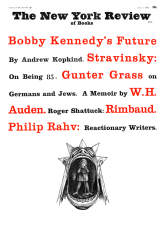In response to:
The CIA and the Intellectuals from the April 20, 1967 issue
To the Editors:
Jason Epstein’s penetrating article on “The CIA and the Intellectuals” [April 20] stimulated me to re-read Irving Kristol’s 1952 article. While Epstein’s over-all characterization of Kristol’s article is accurate, I think that it would be worthwhile reprinting a passage from the Kristol article. Kristol is discussing Alan Barth’s concern with threats to judicial rights to privacy arising out of the placement of FBI undercover operatives who had joined the Communist Party. Kristol writes:
A noble sentiment, and the unwary reader assents—who is against the right to privacy, and who is not prepared to be concerned with its violation? Only the exceptionally attentive will note that the supposed threat to “the traditional rights of privacy” is “a matter of mere conjecture.” Whose conjecture? We are not told. Is there any ground for such a conjecture? We are not told that either. Is Mr. Barth against the use of undercover agents in principle? He does not say so. Is he against the use of undercover agents in Communist organizations? He does not say this, either. He would seem to be against dispersing FBI agents in bona fide labor unions, lawful voluntary associations, and political groups, and reminds us of the consequences. But who is for it? The answer, which he does not bother to give, is: nobody—and that is why the FBI is doing no such thing and why the whole business is a “matter of mere conjecture.”
This passage is probably the best single documentation of Mr. Epstein’s thesis. As the lawyers say, res ipsa loquitur.
Jerome H. Skolnick
Center for The Study of Law and Society
University of California
Berkeley
This Issue
June 1, 1967



